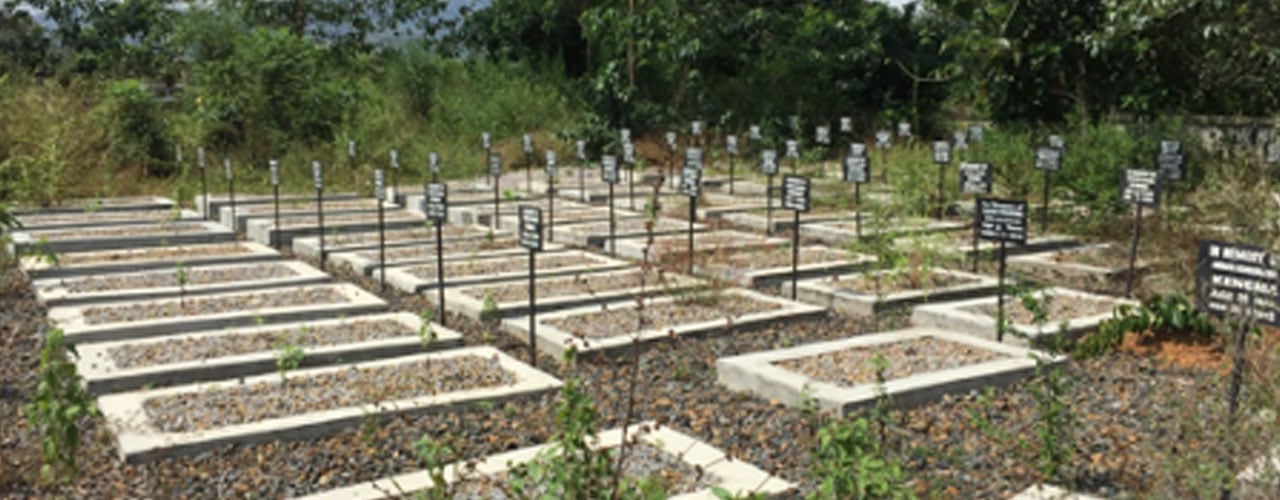This collaboration between Njala University, Sierra Leone, and LSHTM focuses on dissemination of findings from the MRC funded Ebola Gbalo research project on three questions:
- In what ways has the international Ebola-response affected Sierra Leone's health system and its ability to withstand future shocks?
- How can international, national and local emergency response mechanisms be utilised to build a resilient health system in Sierra Leone?
- What lessons emerge?
Our multi-disciplinary team is made up of academics and researchers from the London School of Hygiene & Tropical Medicine and Njala University, Sierra Leone.
The Rethinking Humanitarian Approaches (MRF funded) initiative seeks to disseminate findings from the Ebola Gbalo (MRC funded) research project through film, advocacy, and workshops to examine lessons learned for improving community engagement in local, national and international responses to pandemic outbreaks and build resilience to future shocks. The research and dissemination initiatives are a collaboration between the London School of Hygiene & Tropical Medicine, UK; Njala University and Eastern Technical University Sierra Leone.
Read more related materials from the original research of the Ebola Gbalo project (including resources, blogs, and papers).
The Rethinking Humanitarian Approaches: Gaps in Existing RCCE Guidance
Background and rationale
Our research and similar works have found that a lack of community trust and involvement in Sierra Leone’s national Ebola response has delayed and undermined efforts to stop the spread of the disease. It has put patients, frontline responders, and humanitarian stakeholders in life-threatening positions, and inhibited the use of effective Ebola vaccine and experimental treatments available. Ultimately, there is the need for a structural and sociological shift to include and act on local perspectives in any crisis response. It has been funded by the Medical Research Foundation Grant number: MRF-145-0012-DG-MAYH-C0919.
Our research highlights that a lack of community trust and minimal community involvement in leading and responding to Sierra Leone’s national Ebola response, delayed and undermined efforts to stop the spread of the disease. Similar findings arose from the response to the outbreak in Democratic Republic of Congo. As a result, communities, frontline responders, and humanitarian stakeholders have been placed in life-threatening positions, and the uptake of effective Ebola vaccines and experimental treatments has been delayed. Research calls for stronger, rapid coordination with a variety of local first responders in affected (and as yet unaffected) communities as a key step to establishing the inclusive, trust-based decision making that is critical for effective outbreak response.
Objectives
This initiative aim to reshape policies and guidelines for crisis-responses and to enable better incorporation of local wisdom and capacities that promote more culturally sensitive, effective approaches to improve health in crisis situations. This has consisted of the production of a short film showcases the stories of local first-responders to the Ebola outbreak (from the frontline health system and affected communities); collaborative workshops and development a policy brief and guidance document on how to improve community engagement.
Outcomes
- a short film in which frontline responders tell their stories of how they took action to protect their communities
- a policy brief outlining key research findings and implications for policy and practice action in order to sustainably respond to shocks and
- a guidance document intended to assist humanitarian country operations in various contexts when undertaking RCCE activities related to crises such as Ebola outbreaks, COVID-19, and others.
LSHTM
- Prof Susannah H Mayhew (PI)
- Prof Dina Balabanova
- Prof Johanna Hanefeld
- Prof Melissa Parker
- Linnet Griffith-Jones Project Manager
- Amanda Quintana PhD Candidate
- Georgia Venner PhD Candidate
Njala University, Sierra Leone
- Lawrence Sao Babawo
- Tommy Mathew Hanson
- Prof Bashiru Koroma
- Esther Yei-Mokuwa
- Prof Paul Richards
- Ahmed Vandi
Eastern Technical University, Sierra Leone
- Alfred Mokuwa
Film
- A short film in which frontline responders tell their stories of how they took action to protect their communities
Presentations
- Reconfiguring Humanitarian Responses to strengthen community resilience to shocks. Ebola Gbalo research group. Accra, Ghana, Oct 2022
- Rethinking Humanitarian Approaches – Gaps in existing RCCE Guidance. Susannah Mayhew. Accra, Ghana, Oct 2022
Papers
- Catalysing Local Leadership to Sustainably Respond to Shocks. Ebola Gbalo research group. March 2023
- Catalysing local leadership to sustainably respond to shocks. Ebola Gbalo Research Group. 2023
- Rethinking humanitarian approaches: Practical guidance on how to strengthen community engagement in crisis response. Ebola Gbalo Research Group. 2023
Original research papers and presentations
- (Re)arranging "systems of care" in the early Ebola response in Sierra Leone: An interdisciplinary analysis. Mayhew, Susannah H; Balabanova, Dina; Vandi, Ahmed; Mokuwa, Gelejimah Alfred; Hanson, Tommy; Parker, Melissa; Richards, Paul; (2021) Social science & medicine, 300. 114209-. ISSN 0277-9536 DOI: 10.1016/j.socscimed.2021.114209
- Responding to the 2018-2020 Ebola Virus Outbreak in the Democratic Republic of the Congo: Rethinking Humanitarian Approaches. Mayhew, Susannah H; Kyamusugulwa, Patrick Milabyo; Kihangi Bindu, Kennedy; Richards, Paul; Kiyungu, Cyrille; Balabanova, Dina; (2021) Risk Management and Healthcare Policy, 14. pp. 1731-1747. DOI: 10.2147/RMHP.S219295
- Rural populations exposed to Ebola Virus Disease respond positively to localised case handling: Evidence from Sierra Leone. Mokuwa EY, Maat H (2020) PLOS Negl Trop Dis 14(1): e0007666. DOI: 10.1371/journal.pntd.0007666
- Ebola Gbalo Research Group (2019): Responding to the Ebola virus disease outbreak in DR Congo: when will we learn from Sierra Leone?, in: The Lancet online May 29, 2019, DOI: 10.1016/S0140-6736(19)31211-5, Download a pre-print version of the article
- Trust, and distrust of Ebola Treatment Centers: A case-study from Sierra Leone. Richards P, Mokuwa E, Welmers P, Maat H, Beisel U (2019). PLOS ONE 14(12): e0224511. DOI: 10.1371/journal.pone.0224511
- Ebola and public authority. Saving loved ones in Sierra Leone. Parker, Melissa, et. al (2019), in: Medical Anthropology online 20 May 2019, DOI: 10.1080/01459740.2019.1609472
See further resources in French from related research.

